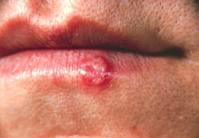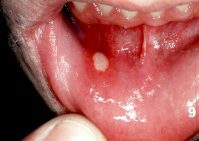Fever blisters, also called cold sores (caused by the herpes simplex virus-1, HSV-1) occur usually on the lower lip, but can also occur on the upper lip (even throat, nose, chin, inside cheeks, gums and roof of the mouth). These always occur in the same place on the lip. These often appear during stress, sick times with cold – flu – other, pregnancy, but also with prolonged exposure to sun or cold. Cold sores are contagious and direct contact with other people should be avoided (also toothbrush, utensils, towel) to prevent transmitting the virus that causes the sore until it is healed. Keeping the sore area covered with a cream or ointment until healing is completed will make things more comfortable – be sure to wash hands before/after application (better with glove or Q-Tip).
A significant option for regular cold sore sufferers are Valtrex tablets (Rx required) that can be immediately at the first sign, or proactively before those situations that usually bring on cold sores (prolonged exposure to cold / sun).
There is an excellent prescription cream that works very well: Denavir (applied every 2 hours at the immediate onset of symptoms can prevent blistering from even occurring). Unfortunately, even though there is now a generic available (updated 11/21/2022) it is still very expensive.
Lysine, an essential amino acid (of the twenty-two standard amino acids, eight are called essential amino acids because the human body cannot synthesize them), has long been reported to be a helpful nutritional adjunct in preventing cold sores. A adult daily dose of 1500-3000 mg appears to provide quite a preventive benefit.
- check with your health care provider about such supplementation if you have osteoporosis; lysinuric protein intolerance (in children); or kidney disease (Drugs.com)
- A trial conducted on subjects with recurrent HSV infection also proved the efficacy of lysine treatment against HSV when the lysine group reported less recurrence, shortened healing time, and milder symptoms during six months of taking L-lysine monohydrochloride tablets while avoiding arginine-rich foods. (Viruses. 2021 Jul; 13(7): 1301)
- The recommended daily dose for prevention is between 1500-3000mg. If you feel an outbreak coming on, you will want to increase your dosage to 3000 mg. (Drugs.com, Medically reviewed by Drugs.com. Last updated on April 7, 2023.)
Abreva is an over-the-counter cream for the treatment of cold sores; however, note that it minimally prevented from proceeding to blister stage, and reduced healing time by less than one day (clinical results pg 7).
Canker sores (aphthous ulcers, recurrent aphthous ulcers)[RAU’s]) occur inside the mouth usually not right next to teeth, but under the tongue or between the gums and cheek. It is not known what causes these, but they are frequently painful. Canker sores are not contagious. These often occur during times of stress, and often acidic foods bring them on (oranges, lemons, grapefruit, tomatoes, etc.). Once the canker sore appears, it will take about a week to heal.
Canker Cover
A very effective treatment (not a cure) is Canker Cover, a bioadhesive patch (no prescription required). Patients who used Canker Cover had 78% of sores healed within 8 to 12 hours and average overall healing time of 1.5 days. Often used in conjunction with Canker Cover is an immediate application of Kenalog in Orabase (prescription required), and then the Canker Cover.
B12
A 2009 study reported in a review article showed dramatic benefits for canker sore sufferers taking daily vitamin B12 supplementation. Vitamin B12 is an essential water-soluble vitamin that is commonly found in a variety of foods such as fish, shellfish, meat, and dairy products. A dose of 1000 mcg of vitamin B12 was used in patients in the intervention group for 6 months. The duration of outbreaks, the number of ulcers, and the level of pain were reduced significantly at 5 and 6 months of treatment with vitamin B12, regardless of initial vitamin B12 levels. During the last month of treatment a significant number of participants in the trial group reached “no aphthous ulcers status” versus placebo (74.1% vs 32.0%).
Lysine, an essential amino acid (of the twenty-two standard amino acids, eight are called essential amino acids because the human body cannot synthesize them), has long been reported to be a helpful nutritional adjunct in treating and preventing canker sores. A adult daily dose of 500 mg appears to provide quite a preventive benefit, while increasing that to 1000 mg twice daily during an outbreak speeds healing notably.
Some people are sensitive to a common ingredient in most toothpaste called sodium lauryl sulfate that may cause canker sores. An excellent toothpaste (without SLS) to use for people sensitive to SLS is Biotene.


